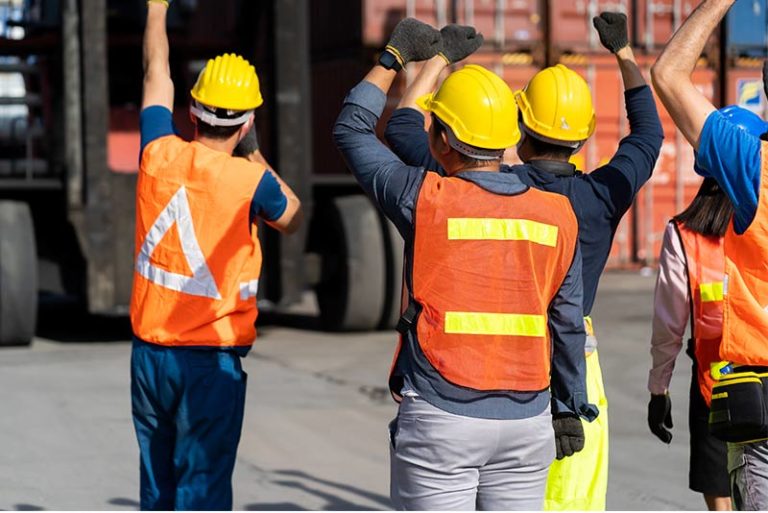During transit, bottlenecks and backlogs disrupt supply chain schedules. So, when transportation and logistics workers strike for better conditions, delays usually result. Labor issues are one of the biggest ongoing threats to shipping lines, railroads, and trucking companies, according to Bloomberg. What can you do to protect your supply chain from the consequences of transportation strikes? Read on.

1. What is causing logistics and transportation strikes?
In transportation and logistics, labor issues are among the top three threats to the smooth flow of goods. Long hours, stressful conditions, and an aging workforce puts pressure on workers. Filling empty positions in the sector is tough. This tight labor supply bolsters unions to demand better conditions and compensation.
Worker grievances also include work safety, health benefits, and schedules, including more paid time off. Calls to remove COVID-19 vaccine mandates, or to improve workplace protection from the pandemic, were also a catalyst for transportation strikes.
2. What are the impacts of transportation strikes
Among the impacts on supply chains during logistics and transportation strikes are delivery delays, and rising shipping costs, which all affect your bottom line. When you can’t get the parts you need, nor deliver the goods you produce, loss of revenue, contract fines, and damage to reputation are just some of the consequences:

- Delays. Producers will not get the needed parts and materials on time. Customers have to wait for finished goods.
- Shortages. Lack of parts, materials, or components could lead to production stops. Enterprises or entire industries could be forced to shut down.
- Higher prices. Rising prices for gasoline and fuel continue to squeeze profitability. Then price rises for transported goods, also drive inflation.
- Loss in revenue and job cuts. If manufacturers can’t deliver the goods, less money comes in. Loss of profitability can thus lead to layoffs.
- Contract fines and damage to reputation. Enterprises could face penalties for late delivery or non-fulfilment of contract. Business partners or consumers lose trust.
3. Supply chain disruptions during transportation strikes
Fragile transportation supply chains and instable logistics hubs are easily disrupted by labor issues. The US, UK, France, South Korea, Spain are among the countries recently hit by transportation strikes. All modes of transport were affected: air, rail, road, ports and shipping. Instances and consequences include:
Airport strikes
Recent strikes by pilots and ground crews caused flight cancellations and chaos in Europe and the US. The situation was made worse by the scramble for staff amid surging demand for flights. As commercial flights carry substantial cargo shipments, cancellations from airport strikes also affect air-freight space and rates.
Rail strikes
Massive rail strikes have also threatened rail freight in the US. Work stoppage could shock supply chains and “cripple the economy,” potentially costing $160 billion per day. Consumers may not immediately feel the effects, yet heavy industry relies on railways.
Truckers strikes
Remember the blockades on the US-Canadian border? Truckers protesting the coronavirus vaccination mandate barricaded border crossing, including Ambassador Bridge. The bridge between Detroit, Mich., and Windsor, Ontario carries 25% of all trade between the U.S. and Canada.
Losses totaled some $1 billion per day. Deliveries of critical car parts were delayed for nearly a week. Elsewhere, truck drivers in Australia, UK, EU, in Spain, France went on strike for better pay and conditions. In South Korea, high fuel costs prompted independent truckers to protest for a guaranteed minimum wage.

4. Ripple effect of transportation strikes
Disruption in even a smaller, specialized transportation mode ripples through the entire logistics supply chain. For example, striking tugboat workers in Australia were locked out by their employer in November. Such tugboats are needed to safely maneuver huge container ships into ports.
Minister for Workplace Relations Tony Burke summed up the ripple effect of a supply chain strike for the media. “[The dispute] affects the people at the ports, it affects the truck drivers, people at warehouses and ultimately… consumers shopping at Christmas time.”
5. How to protect your supply chains from strikes
With Sphera Supply Chain Risk Management [formerly riskmethods] AI-based supply chain risk management, you can prepare your supply chain for strikes. Take action before it’s too late. Using 24/7 monitoring, you quickly learn of union protests and transportation strikes at hubs such as ports, as well as supply paths. Then you can use an alternative means of delivery or transport route. Or you might order from a supplier based in a different region.

With Sphera Supply Chain Risk Management [formerly riskmethods], you can:
- Visualize all your suppliers, vendors, third parties, customers, and supply paths on a world map. Include sub-tiers, your own sites, customer sites, and country-specific risks for a truly resilient supply chain.
- Monitor the transportation supply chain for emerging issues such as labor strikes, so you can address logistics risk before it materializes.
- Get real-time information on all types of risk. React fast enough to avoid supply chain disruption. You don’t have to wait until you receive notice that your cargo is stuck in transit.
- Assess risks and analyze impact You can initiate measures to reduce bottlenecks and delays.
- Streamline proactive and reactive mitigation actions so you can meet your customers’ demands
Supply chains in logistics and transportation are also vulnerable to other types of risk. Cyber, man-made, financial, reputational, or natural hazard events all threaten to interrupt the flow of goods. Get a total view of risk and be prepared. Go the last mile and deliver the goods when your competitors cannot.
riskmethods was acquired by Sphera in October 2022. This content originally appeared on the riskmethods website and was slightly modified for sphera.com.






